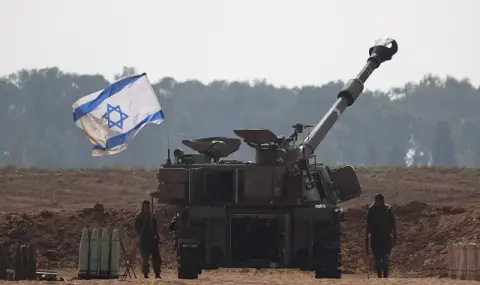A new meeting of Israel's wartime cabinet yesterday, which discussed options for Israel's retaliation to the Iranian attack with over 300 drones and missiles on the night of April 14, is a main topic in the Western publications.
"After revenge comes revenge" - this is how the material in the "Washington Post" begins. of the analyst of the American newspaper Ishaan Tharoor, in which it is emphasized that the escalation of tensions between Israel and Iran and, accordingly, the expectation of what the Israeli response will be, shifts the focus of world attention from the Gaza Strip.
According to the author of the article, the Iranian attack two days ago "astonished" with its scale, as from Tehran's point of view the attack was a response to an Israeli operation in which seven senior Iranian officers of the Islamic Revolutionary Guard Corps were killed in an Iranian consulate building in Damascus, Syria.
However, from Israel's point of view, Iran's actions require Israeli actions in response, the "Washington Post" states. Tharoor quoted in his analysis the chief of the general staff of the Israeli army Herzi Halevi, according to whom “the firing of so many rockets and drones into Israeli territory calls for a retaliatory strike”.
In the commentary of the "Washington Post" it is noted that at the time of writing it was not clear what the response would be, although a new Israeli attack was in any case highly likely. Iran and Israel have been locked in a silent war for years, peppered with airstrikes, assassinations and sabotage, but the current round of escalating tensions has sharpened the prospect of open war between the two powers in the Middle East - creating a volatile, explosive ground that is likely to will lead to an increase in violence in the region, Tharoor notes.
Iran has signaled that it does not want to participate in a full-scale war, neither personally nor through proxies such as the Lebanese Shiite group Hezbollah, the Washington Post said, adding that the regime in Tehran had sent a kind of telegram. along with its retaliation to the April 1 attack in Damascus. Although the attack on the night of the 14th was repelled by the joint efforts of Israel, the United States and Arab countries such as Jordan, Iran considers it a symbolic victory.
Far-right members of Israeli Prime Minister Benjamin Netanyahu's government have called for a resounding response, while Israel's allies, including US President Joe Biden, are urging restraint, the Washington Post notes, while noting that the unfolding "drama with blows exchanged" has somewhat eased the pressure on Netanyahu and his wartime cabinet. They are facing growing international dissatisfaction with the way the military operations in Gaza are being conducted, which have so far killed more than 33,000 Palestinians and led to a humanitarian catastrophe in the besieged territory, writes the Washington Post.
On the other hand, the international response to the Iranian attack has reminded Israelis of the long-standing support given to them both by the West and by their Arab neighbors in the region - such as the monarchies of the United Arab Emirates and Saudi Arabia, which are skeptical to Tehran's intentions, adds Tharoor in his analysis in the publication.
According to Isabel Kershner, who commented from Jerusalem for another American newspaper - "New York Times", all of Israel's possible choices to respond to Iran's attack carry risks. "The options for an Israeli response range from an open and forceful strike on Iran to inaction. "One of the factors in evaluating possible retaliation is that the massive air attack caused minimal damage," Kershner noted.
In the past, Israel has retaliated strongly when its enemies attacked, hoping to dissuade them from further hostilities, and a 2006 cross-border attack by the Iranian-backed Lebanese group Hezbollah set off a devastating months-long war, the New York Times said, noting that history has now repeated itself with Hamas. in Gaza.
This time, however, Israel is juggling multiple conflicting interests, as well as some new circumstances, Kershner points out, according to whom the Iranian attack is also a test of Netanyahu's political resilience. If it does respond to the unprecedented direct Iranian attack, Israel must consider whether to do so in proportion to the actual results of the Iranian attacks, which were largely blocked by air defenses, Kershner wrote in the "New York Times".
Through its author Bethan McKernan, the UK's "Guardian" asks in the title the question "How will Israel respond to Iran's attack and can it handle a war?"
Israel's Wartime Cabinet – Prime Minister Benjamin Netanyahu, Prime Minister, Defense Minister Yoav Galant and Benny Gantz, former Defense Minister and a centrist opponent of Netanyahu – have spent the past two days discussing how to respond to Iran's first direct attack on the Jewish state, the Guardian describes the events in turn.
According to widespread opinions, the caliber of Israel's next steps is expected to be shaped along two axes, the British publication writes - the country must take some action to show Iran that such an unprecedented show of force cannot go without consequences, but at the same time it must take into account Tehran's threat to strike again, and with more force, if Israel decides to retaliate.
Although the destructiveness of the Iranian strikes could have been much greater, with only one reported casualty - a seven-year-old girl - a major red line was still crossed from the point of view of Israel's security, notes the "Guardian".
>
The important questions about the Israeli response are "How?" and "When?", Bethan McKernan writes, and continues that while the statements by Gallant and Gantz hint that a direct Israeli response to Tehran is not out of the question, Netanyahu has not yet made an official decision. Israel's chief military spokesman, Rear Admiral Daniel Hagari, made it clear that Israel is keeping its options open, the Guardian reports.
